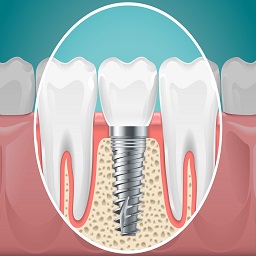Dental Implants



What is a Dental Implant?
Dental implants are specialized screws made of titanium or zirconium that mimic the root of a tooth and are placed into the jawbone in cases of one or more missing teeth.
Dental implants have revolutionized dentistry, particularly for fully edentulous patients, by eliminating the need for removable dentures and providing significant improvements in comfort, function, and aesthetics. Routine check-ups and proper oral hygiene are aimed at ensuring the longevity of implants throughout a person’s life.
Whether you are a suitable candidate for dental implants is evaluated after assessing the condition of your bone in our clinic. Surgical procedures and prosthesis design are planned, and you are provided with detailed information.
Dr. Deniz Boybeyi has received special training in implant surgery and diseases related to the area around implants. She continues to attend various seminars and conferences.
Completing missing teeth with implants not only restores function and aesthetics but also helps preserve the existing volume of the jawbone.
What Are the Most Important Factors Affecting Implant Success?
General health, the volume, length, width, and quality of existing bone, smoking habits, and oral hygiene are among the most critical factors affecting the success of implants.
While there's no upper age limit for implant procedures, it's advisable to wait for the completion of bone development in young individuals.
Proper oral care, following the methods and using the recommended products shown to you at our clinic, plays a significant role in the long-term success of implants.
How Should Post-Operative Care Be Done?
Experiencing mild discomfort after the surgery is normal. It's not recommended to engage in strenuous activities, smoke, or consume alcohol on the day of the surgery.
You should follow the instructions provided for the care of your stitches and take prescribed medications as directed.
During this period, it's essential to avoid traumatizing the area with hard foods and to pay adequate attention to oral hygiene for smooth wound healing.
How Does the Post-Operative Process Progress?
After the implant surgery, cellular integration between the implant and the jawbone is expected to occur. This osseointegration process can take between 2 to 6 months.
Temporary dentures may be possible during this period if deemed appropriate.
Once the implant-bone attachment is completed, preparations for the planned type of prosthesis are initiated.
Why Do Implant Prices Vary?
The prices of dental implants can vary due to factors such as the brands of implants and the benefits they offer, the countries in which they are manufactured, the experience of the performing dentist, the techniques used, and the materials involved.
How Is an Implant Placed?
To ensure the patient experiences no pain, local anesthesia is administered first. If there is a tooth that needs to be extracted in the area where the implant will be placed, it is removed. After making an incision in the gum, the implant is inserted into the jawbone, and the gum is sutured over the implant.
Following this, healing times are allowed for the implant to osseointegrate with the bone at a cellular level.
Note: This information is provided for informational purposes only. The specific details of an implant procedure and post-operative care should always be discussed
with a qualified dental professional.


